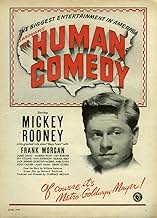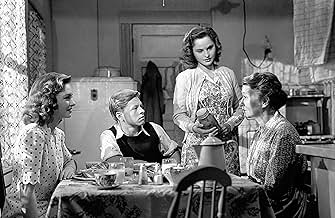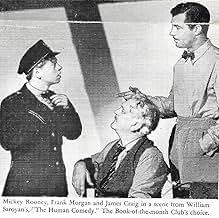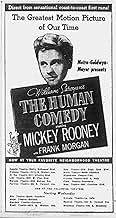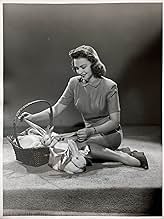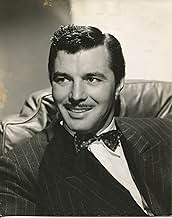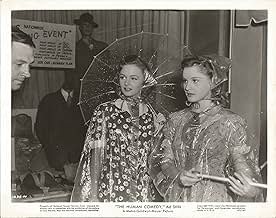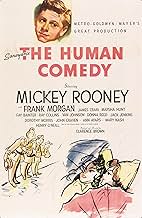Teenager Homer Macauley stays at home in small-town Ithaca to support his family while his older brother Marcus prepares to go to war.Teenager Homer Macauley stays at home in small-town Ithaca to support his family while his older brother Marcus prepares to go to war.Teenager Homer Macauley stays at home in small-town Ithaca to support his family while his older brother Marcus prepares to go to war.
- Director
- Writers
- Stars
- Won 1 Oscar
- 7 wins & 5 nominations total
- Ulysses Macauley
- (as Jack Jenkins)
- Director
- Writers
- All cast & crew
- Production, box office & more at IMDbPro
Featured reviews
This film displays this love for America in the special way of the home front milieu of the 40s. No doubt, it's a sentimental, even maudlin look at the meaning of "home." Homer McCauley (Mickey Rooney) is a telegraph runner for his boss, the wonderful Frank Morgan, in the small California town of Ithaca, where he must deliver telegrams to the folks who have lost a loved one in the war. The film shows in many touching ways what it was like to be on the sidelines (keep your chin up; do the best you can) while the boys where fighting "over there."
As a small boy growing up in Germany during this time, it was one of the first American films I ever saw. It, more than any other thing, made me understand what it would be like to be somewhere where the little things in life are important, while the 'big stuff' takes care of itself. A place where small, unimportant folks count for as much as, or even more than, the ones hogging the news.
Watch this film if you can (shown on Turner Classic Movies) and see what we have lost and what we must find a way to get back into our lives.
In 1943, M-G-M commissioned author William Saroyan to develop a screen story about the World War II homefront. The result was this, which Howard Estabrook turned into a screenplay and Saroyan himself expanded into a novel -- which explains why the film was released before the book was published.
Yes, "The Human Comedy" is propaganda, but with a difference. Most of the propaganda of WWII arose from anger and grim determination, and films like "Air Force" and "Operation Tokyo" look excessive and embarrassing now that passions have cooled. The propaganda of "The Human Comedy" rises not from anger but from fear -- the fear that the crucible of war might be too harsh for the spirit of small-town America to survive.
To be honest, much of "The Human Comedy" also looks excessive and embarrassing now the fears have been alleviated. But few films struck such a chord in audiences of the time by showing them, if not as they were, then at least as they liked to picture themselves.
The film's appeal now is more than just as a historical curiosity, however. Despite the Andy Hardy sentimentality and Saroyan's blue-collar pseudo-poetry, "The Human Comedy" has much to recommend it if you can resist viewing it through the prism of our own time, with the war safely won these 50 years. It has, for example, one of Mickey Rooney's best and most restrained performances and a charming performance by Jackie "Butch" Jenkins as his baby brother -- he became a child star on the strength of this film, but was never this good again.
Frank Morgan, too, is first-rate as a sad old man taking pride in his work and refuge in his bottle; Morgan was an idiosyncratic actor, but he was capable of great depth and deserves to be known for something besides "The Wizard of Oz." Director Clarence Brown, now sadly neglected, shows once again his sure touch with Americana and his sensitive handling of child and teen actors.
"The Human Comedy" is a bit cloying, perhaps, but it's also a compassionate and generous-spirited film. It deserves to be regarded with the same generosity.
With oldest brother Marcus away fighting in World War II, it falls to Homer (Rooney) to add to the money his brother sends their mother (Fay Bainter) by getting a job in the local telegraph office after school. There, he finds himself sobering up the drunken man who runs the telegraph (Frank Morgan) and delivering telegrams - sometimes singing, sometimes from the War Department informing a family of a death. Homer has to grow up fast and ponder some serious issues.
There are others besides the Macauleys - kind Tom Spangler and his upper class girl (Marsha Hunt) - Tom is nervous about meeting her parents. Then there is Tobey (John Craven) a soldier with no parents and no real home who is befriended by Marcus while in the service.
"The Human Comedy" is filled with delightful scenes of innocence, goodness, sadness, mischief, tragedy and humor. One night, Bess Macauley and her friend Mary are on their way to the movies when they meet three lonely soldiers on leave (one of whom is Robert Mitchum) and invite them to come along. When the men leave them, the girls get a kiss on the cheek; the youngest Macauley, Ulysses, finds himself alone when the other boys leave after watching a live ad for a drink - is the man a real man or a huge wind-up toy? When he leans over and scares the heck out of Ulysses, Ulysses finds out and runs for his life.
The scenes of Marcus and his fellow soldiers shows us the youth of these men, their fears, and their homesickness; the scenes of the people at home show us what not having any young men around is like for a small town - the worry and the loneliness as they keep things together so their sons and fathers will have something to come home to.
Mickey Rooney, one of the screen's great talents, gives a subdued yet emotional performance as Homer. Frank Morgan is very good as the pathetic Mr. Grogan, and Van Johnson is likable as Marcus. The rest of the cast follows suit - everyone is excellent.
Was a town ever like this? Possibly, in a gentler time. The Human Comedy reminds us of old-fashioned things like responsibility, letter-writing, and prayer, and that love is eternal. A very warm movie. Highly recommended.
Did you know
- TriviaMarsha Hunt (1917-2022) and Darryl Hickman (1931-2024) were the last surviving cast members.
- GoofsNear the end of the film when Homer and his friends walk to the telegraph office Homer's tie is tied up short (the tail below the broad part of the tie) but when Homer enters the office and in the following scenes, the tie is tied correctly.
- Quotes
Mr. Macauley: I am Matthew Macauley. I have been dead for two years. So much of me is still living that I know now the end is only the beginning. As I look down on my homeland of Ithaca, California, with its cactus, vineyards and orchards, I see that so much of me is still living there - in the places I've been, in the fields and streets and church and most of all in my home, where my hopes, my dreams, my ambitions still live in the daily life of my loved ones.
- Alternate versionsAlso available in a computer colorized version.
- ConnectionsFeatured in MGM: When the Lion Roars (1992)
- SoundtracksMy Old Kentucky Home, Good Night
(1853) (uncredited)
Music and Lyrics by Stephen Foster
Sung a cappella by Ernest Whitman
Also sung by Mickey Rooney and Jackie 'Butch' Jenkins
- How long is The Human Comedy?Powered by Alexa
Details
- Release date
- Country of origin
- Languages
- Also known as
- La comedia humana
- Filming locations
- Production company
- See more company credits at IMDbPro
Box office
- Budget
- $1,000,000 (estimated)
- Runtime1 hour 57 minutes
- Color
- Aspect ratio
- 1.37 : 1
Contribute to this page



